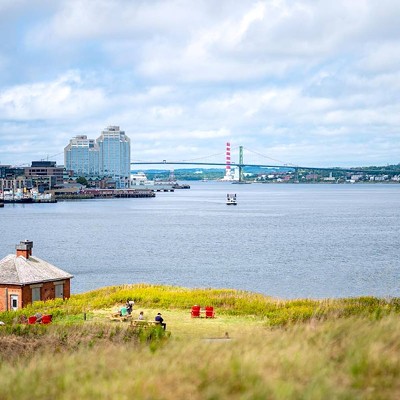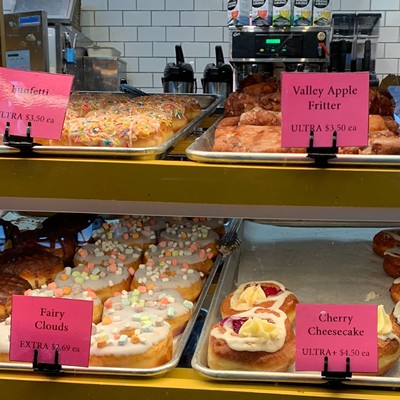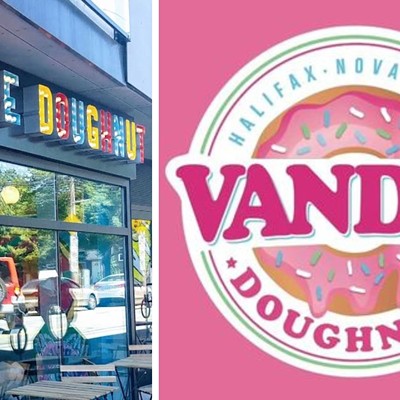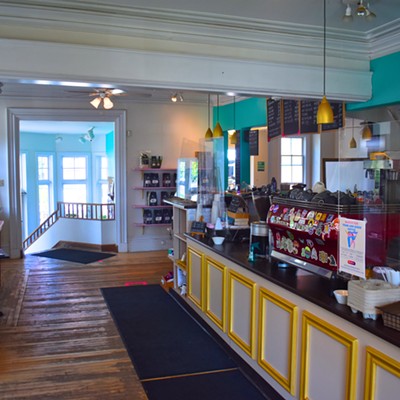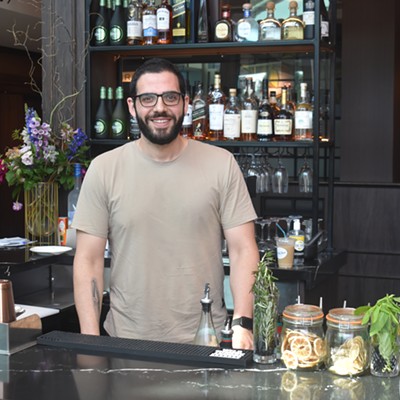Small retail stores still struggling to stay open while navigating COVID-19 restrictions
“We’re flying blind,” says Cathy Hope of Lady Luck Boutique.
[
{
"name": "Air - Inline Content - Upper",
"component": "26908817",
"insertPoint": "1/4",
"requiredCountToDisplay": "8"
},{
"name": "Air - Inline Content - Middle",
"component": "26908818",
"insertPoint": "1/2",
"requiredCountToDisplay": "8"
},{
"name": "Air - Inline Content - Lower",
"component": "26908819",
"insertPoint": "100",
"requiredCountToDisplay": "1"
}
]
COVID-19 restrictions have plagued industries in Nova Scotia for the better part of a year. Some businesses have had forced shut-downs, modified regulations around opening hours and clear capacity guidelines.
But for the retail store industry, restrictions have been less specific.
“Retail is different from restaurants, gyms and beauty salons in the sense that we were never closed, but we were unable to operate,” says Cathy Hope, owner of Lady Luck Boutique in the Hydrostone market, an artisan shop selling clothing, hats and jewellery.
Unlike the restaurant industry or the cosmetology industry—which are regulated by the Restaurant Association and Cosmetology Association, respectively—retail stores have no governing body.
While the Retail Council of Canada does provide resources like a store capacity calculator, the council has no specific Nova Scotia regulations listed beside other provinces.
Hope tells The Coast most stores have resorted to overcompensating and following even stricter guidelines than those set out by the department of health. “The 25 percent of occupancy restriction that we were put under in November was very problematic because nobody could find what their occupancy numbers were. I just guessed and I went with four,” she says.
Other Hydrostone storefronts, many of which are only half the size of Hope’s 1,500 square foot boutique, had even less space to make room and make adjustments with the new regulations.
“I removed furniture from the store, I cut back on my stock, because I’m aware that I have a lot of older clients, a lot of my clientele is middle-aged and up. But I also sell chemo hats, so I was also conscious that some of my clients would be immuno-compromised,” says Hope.
Some local business owners are working together to discuss regulations, plans for social distancing and even how to apply for government grants.
“We have a loose association in the Hydrostone market that are known as the Boss Ladies, and we used to get together regularly around things like social media and how can we improve our opening hours, events and things like that,” says Hope. “Now we just tend to stay in touch about what’s the latest relief program that we can look at? Or how can we do better in this area to bring more people in and make them more comfortable for their shopping experience or eating experience or whatever they’re doing.”
But Hope still thinks an official organization that represents small retail businesses to the government would be beneficial and could lobby on their behalf. “Without an organizing body on our part, I feel as though if things were to change, we could be closed down again,” she says.
Lady Luck isn't alone as a small business struggling through COVID. At least 209 small retail businesses applied for the Nova Scotia government's COVID grants. This compares to 1,120 dining who applied establishments—an industry that does have a representative organization in RANS. (But keep in mind that industry organizations don't always solve the problem.)
Although Lady Luck has been open for almost 14 years, Hope bought the store in August 2019, without knowledge of the worldwide pandemic lurking around the corner.
As an independent business owner—and currently the sole employee and cashier at the shop—Hope has to enforce COVID-19 regulations, too.
“You’re doing absolutely everything, making sure that people are staying six feet apart, wearing their masks, washing their hands, and you’re trying to sell and get them in and out, get their stuff and go,” she says.
But Hope’s biggest fear is getting sick herself. Not for the sake of her health but for her business’ survival. “Self-isolation would be death to my business and many others,” she says. “Every time I see an exposure notice I panic. First of all, was I there? And second of all, when is my store going to be on that list?”
Hope says the only time she’s heard from the government was when she got an unexpected visit from an occupational health and safety officer from the Department of Labour and Advanced Education.
“I didn’t even know that there were spot inspections for retail. I was aware of them because of the restaurant association and the cosmetology association, but I didn’t know there were any for us,” she says. “My first thought is, oh my god someone’s reported me, what did I do wrong?”
Later, Hope found out it was just a routine inspection for COVID-19 protocols like mask-wearing and social distancing—but she worries the stigma around Covid could have an impact on her business. “It might be good for the people there to know that you were just doing a routine inspection,” she says.
More open communication from the government is something Hope is, well, hopeful for over the coming months. “If I had more open dialogue with them I would ask sort of what the end game is here, what’s our goals?” she says.
In terms of regulations, she says some retail stores are still implementing different rules around trying on clothes, touching merchandise, or making returns. While Lady Luck's dressing room remains closed, the lack of clarity from the government has led to some businesses implementing rules that others aren't, and some disregarding rules altogether.
“We’ve decreased the trying on of jewellery and things like that, but when I search for facts and information, as many of us do, we don’t have that representing body that can help us out,” she says. “I actually go to the mall every once in a while, to see if anyone’s doing anything interesting and new or has a better way of doing things than I’m doing them.”
Hope says she’d love to be at the helm of such an industry organization but wants to stay focused on her own business for now. But with so many other local retail stores relying on tourism and Haligonians getting out and about, Hope says it’s time for someone to begin planning for a wider re-opening.
“I would love to see some sort of a forward-looking plan at how we’re going to get back on our feet. We know about the vaccine rollouts, so we know what we’re looking at in terms of herd immunity. I’d like to see looking forward a little bit to how we might see tourism starting again, at what point. And what the government’s going to make people more comfortable”
Lady Luck remains open not just to support Hope's family, but also more than 25 Canadian artisans whose products she showcases in the store and who receive commission from sales.
“My mantra is if you want Halifax to look like Halifax when this is over then you need to shop with us now. You need to shop with us, you need to go to Lara’s for coffee, you need to go to the Ostrich Club for dinner because it will not be here [if not]. We’re not going to magically re-open, and I find it’s getting harder and harder to survive.”
In the meantime, Lady Luck is opening an online shop with options for curbside pickup, and Hope is adapting to new products that are more necessary than ever before.
“I will not be doing workwear, I will be doing Zoom call wear,” she says. “I’m pivoting to slightly more necessities, a few more essentials, with the plan to pivot back as people start to go out and go to the office and do more things.”
But for the retail store industry, restrictions have been less specific.
“Retail is different from restaurants, gyms and beauty salons in the sense that we were never closed, but we were unable to operate,” says Cathy Hope, owner of Lady Luck Boutique in the Hydrostone market, an artisan shop selling clothing, hats and jewellery.
Unlike the restaurant industry or the cosmetology industry—which are regulated by the Restaurant Association and Cosmetology Association, respectively—retail stores have no governing body.
While the Retail Council of Canada does provide resources like a store capacity calculator, the council has no specific Nova Scotia regulations listed beside other provinces.
Hope tells The Coast most stores have resorted to overcompensating and following even stricter guidelines than those set out by the department of health. “The 25 percent of occupancy restriction that we were put under in November was very problematic because nobody could find what their occupancy numbers were. I just guessed and I went with four,” she says.
Other Hydrostone storefronts, many of which are only half the size of Hope’s 1,500 square foot boutique, had even less space to make room and make adjustments with the new regulations.
“I removed furniture from the store, I cut back on my stock, because I’m aware that I have a lot of older clients, a lot of my clientele is middle-aged and up. But I also sell chemo hats, so I was also conscious that some of my clients would be immuno-compromised,” says Hope.
Some local business owners are working together to discuss regulations, plans for social distancing and even how to apply for government grants.
“We have a loose association in the Hydrostone market that are known as the Boss Ladies, and we used to get together regularly around things like social media and how can we improve our opening hours, events and things like that,” says Hope. “Now we just tend to stay in touch about what’s the latest relief program that we can look at? Or how can we do better in this area to bring more people in and make them more comfortable for their shopping experience or eating experience or whatever they’re doing.”
But Hope still thinks an official organization that represents small retail businesses to the government would be beneficial and could lobby on their behalf. “Without an organizing body on our part, I feel as though if things were to change, we could be closed down again,” she says.
Lady Luck isn't alone as a small business struggling through COVID. At least 209 small retail businesses applied for the Nova Scotia government's COVID grants. This compares to 1,120 dining who applied establishments—an industry that does have a representative organization in RANS. (But keep in mind that industry organizations don't always solve the problem.)
Although Lady Luck has been open for almost 14 years, Hope bought the store in August 2019, without knowledge of the worldwide pandemic lurking around the corner.
As an independent business owner—and currently the sole employee and cashier at the shop—Hope has to enforce COVID-19 regulations, too.
“You’re doing absolutely everything, making sure that people are staying six feet apart, wearing their masks, washing their hands, and you’re trying to sell and get them in and out, get their stuff and go,” she says.
But Hope’s biggest fear is getting sick herself. Not for the sake of her health but for her business’ survival. “Self-isolation would be death to my business and many others,” she says. “Every time I see an exposure notice I panic. First of all, was I there? And second of all, when is my store going to be on that list?”
Hope says the only time she’s heard from the government was when she got an unexpected visit from an occupational health and safety officer from the Department of Labour and Advanced Education.
“I didn’t even know that there were spot inspections for retail. I was aware of them because of the restaurant association and the cosmetology association, but I didn’t know there were any for us,” she says. “My first thought is, oh my god someone’s reported me, what did I do wrong?”
Later, Hope found out it was just a routine inspection for COVID-19 protocols like mask-wearing and social distancing—but she worries the stigma around Covid could have an impact on her business. “It might be good for the people there to know that you were just doing a routine inspection,” she says.
More open communication from the government is something Hope is, well, hopeful for over the coming months. “If I had more open dialogue with them I would ask sort of what the end game is here, what’s our goals?” she says.
In terms of regulations, she says some retail stores are still implementing different rules around trying on clothes, touching merchandise, or making returns. While Lady Luck's dressing room remains closed, the lack of clarity from the government has led to some businesses implementing rules that others aren't, and some disregarding rules altogether.
“We’ve decreased the trying on of jewellery and things like that, but when I search for facts and information, as many of us do, we don’t have that representing body that can help us out,” she says. “I actually go to the mall every once in a while, to see if anyone’s doing anything interesting and new or has a better way of doing things than I’m doing them.”
Hope says she’d love to be at the helm of such an industry organization but wants to stay focused on her own business for now. But with so many other local retail stores relying on tourism and Haligonians getting out and about, Hope says it’s time for someone to begin planning for a wider re-opening.
“I would love to see some sort of a forward-looking plan at how we’re going to get back on our feet. We know about the vaccine rollouts, so we know what we’re looking at in terms of herd immunity. I’d like to see looking forward a little bit to how we might see tourism starting again, at what point. And what the government’s going to make people more comfortable”
Lady Luck remains open not just to support Hope's family, but also more than 25 Canadian artisans whose products she showcases in the store and who receive commission from sales.
“My mantra is if you want Halifax to look like Halifax when this is over then you need to shop with us now. You need to shop with us, you need to go to Lara’s for coffee, you need to go to the Ostrich Club for dinner because it will not be here [if not]. We’re not going to magically re-open, and I find it’s getting harder and harder to survive.”
In the meantime, Lady Luck is opening an online shop with options for curbside pickup, and Hope is adapting to new products that are more necessary than ever before.
“I will not be doing workwear, I will be doing Zoom call wear,” she says. “I’m pivoting to slightly more necessities, a few more essentials, with the plan to pivot back as people start to go out and go to the office and do more things.”



